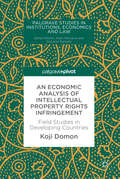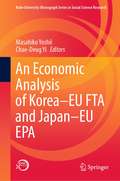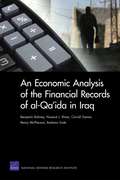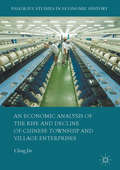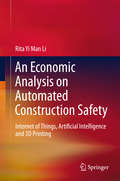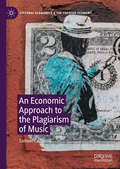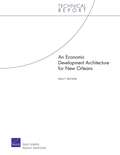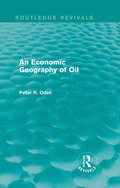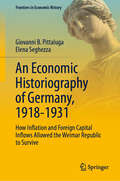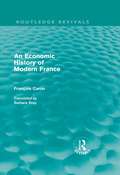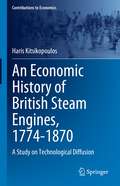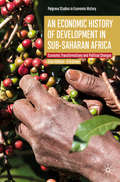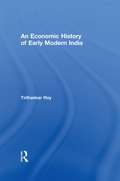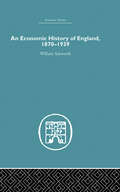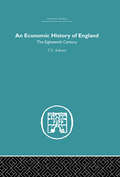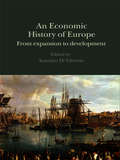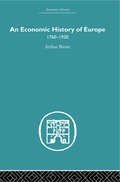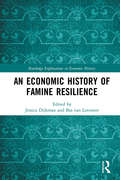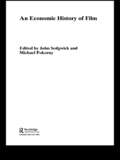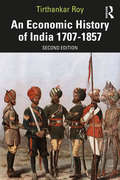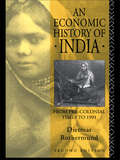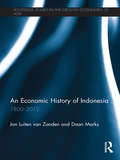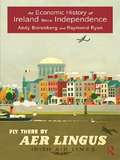- Table View
- List View
An Economic Analysis of Intellectual Property Rights Infringement: Field Studies in Developing Countries (Palgrave Studies in Institutions, Economics and Law)
by Koji DomonUsing unique field research from across Asia, this book examines the real markets of illicit products that breach intellectual property rights (IPR). The text presents three case studies regarding IPR infringements: unauthorised music content; fake spare parts of motorcycles; and fake Japanese food. Each study has unique characteristics, though their general concepts and problems have similar roots. The book shows what is happening in the black market and systems of illicit trade, providing information for stakeholders in Intellectual Property Rights to consider in devising effective methods for minimizing profits lost to copied and fake products.
An Economic Analysis of Korea–EU FTA and Japan–EU EPA (Kobe University Monograph Series in Social Science Research)
by Masahiko Yoshii Chae-Deug YiThis monograph compares two trade agreements among three important economic regions, namely, the Korea–EU free trade agree (FTA) and the Japan–EU Economic Partnership Agreement (EPA). The two new types of agreements came into effect in the 2010s. They not only create more favorable trade and economic conditions in these regions but also produce spillover effects to bring about more comprehensive conditions in other area. First, the quantitative research for both agreements using the CGE model and a tentative analysis of the Japan–EU EPA in the analysis show that both have already created positive impacts on all three economies by lifting or reducing tariff and non-tariff barriers. Such positive impacts are also expected to be felt by SMEs in these countries that are involved. Additionally, the high level of tariff and non-tariff liberalization in the two current agreements will make positive impacts on the negotiation of other FTAs and on WTO reform. The advantages of the FTA and EPA dealt with in this book are not restricted to these economic effects. As the agreements are comprehensive, they will create more favorable social conditions not only in these economic regions but in other areas of Asia as well.
An Economic Analysis of the Financial Records of al-Qa'ida in Iraq
by Benjamin Bahney Carroll Ganier Barbara Sude Renny Mcpherson Howard J. ShatzThis monograph analyzes the finances of the militant group al-Qa'ida in Iraq in Anbar province during 2005 and 2006, at the peak of the group's power and influence. The authors draw on captured financial documents that give details on the daily financial transactions of one specific sector within Anbar province and of the financial transactions of the AQI provincial administration.
An Economic Analysis of the Rise and Decline of Chinese Township and Village Enterprises (Palgrave Studies in Economic History)
by Cheng JinThis book provides a historical economic analysis of two key issues relating to township and village enterprise (TVE) development in China. Firstly, the nature of the evolving relationship between TVEs and local government; in particular how TVE entrepreneurs have used institutionalized power to secure the political influence needed to defend their financial independence. Secondly, the relationship between TVEs and state-owned enterprises (SOEs), and the role of SOEs in China's economic transition. This study highlights the importance of the role of SOEs in the "dual-track pricing system" and its impact on other parts of the economy. Township and village enterprises were key to China's success in the late twentieth century, but have more or less disappeared as an entity over the past decade or so. By measuring the structural difference of the SOE sector before and after 1998-2003 SOE reform, Jin explains their fast catch-up in productivity since the mid-1990s, as well as the relative decline of TVE productivity.
An Economic Analysis on Automated Construction Safety
by Rita Yi LiThis book addresses information technologies recently applied in the field of construction safety. Combining case studies, literature reviews and interviews to study the issue, it presents cutting-edge applications of various information technologies (ITs) in construction in different parts of the world, together with a wealth of figures, tables and examples. Though primarily intended for researchers and experts in the field, the book will also benefit graduate students.
An Economic Approach to the Plagiarism of Music (Cultural Economics & the Creative Economy)
by Samuel CameronThis book is an economic analysis of plagiarism in music, focusing on social efficiency and questions of inequity in the revenue of authors/artists. The organisation into central chapters on the traditional literary aspect of composition and the technocratic problem of ‘sampling’ will help clarify disputes about social efficiency and equity. It will also be extremely helpful as an expository method where the text is used in courses on the music business.These issues have been explored to a great extent in other areas of musical content—notably piracy, copying and streaming. Therefore it is extremely helpful to exclude consumer use of musical content from the discussion to focus solely on the production side. This book also looks at the policy options in terms of the welfare economics of policy analysis.
An Economic Development Architecture for New Orleans
by Kevin F. MccarthyIn response to the current situation in New Orleans in the aftermath of Hurricane Katrina, this report provides recommendations regarding effective organizational and strategic approaches to revitalizing the city's economy, identifies the best practices that other cities have used to foster economic development, describes how these practices might be applied to New Orleans, and considers historical trends and past development missteps.
An Economic Geography of Oil (Routledge Revivals)
by Peter R. OdellAn Economic Geography of Oil, first published in 1963, analyses the reasons behind the spatial distribution of the different sectors of the world oil industry. In the first part of the book, Peter Odell examines the pattern of the world supply of oil, showing the important changes that took place between 1945 and the early 1960s and highlighting the physical, economic, political and organizational factors which contributed to these developments. In the second part, Odell analyses the relationship between oil and other sources of energy, together with the more fundamental relationship between energy consumption in different areas of the world, and economic development. Finally, attention is paid to those aspects of the industry which are concerned with getting the oil from the point of production to that of consumption; the refining industry, transportation requirements and local distribution patterns are studied. These strands are drawn together in a relevant and interesting conclusion, which considers the overall impact of the oil industry on economic and industrial development.
An Economic Historiography of Germany, 1918-1931: How Inflation and Foreign Capital Inflows Allowed the Weimar Republic to Survive (Frontiers in Economic History)
by Elena Seghezza Giovanni B. PittalugaContrary to existing economic analyses of the Weimar Republic, this book looks beyond the explanations of the individual events that characterized it - in particular hyperinflation, Brüning's fiscal policy, and the 1931 crisis. Instead, it adopts a more unified approach, and thereby sheds light on the underlying causes of these events. The book argues that these individual events were the final result of economic processes and policy choices which had made it possible to mitigate the social and political conflict that would otherwise have undermined the Republic’s existence. Specifically, it postulates that hyperinflation was the result of the "persistent" inflation, which had permitted Germany to maintain low unemployment, meet unions' wage demands, and contain left-wing radicalism. Similarly, the banking and currency crisis of 1931 was caused by a sudden stop related to the high level of foreign debt incurred by Germany after the Dawes Plan. Debt which had, however, enabled the country to finance the persistent external deficits resulting from its high domestic demand and large public expenditure incurred in an attempt to avoid social conflict. The book reviews the various models and approaches proposed highlighting their relative strengths and weakness and concludes by providing a unifying common thread which explains how the dramatic economic events which characterized the Weimar Republic were the result of the very economic processes which had contributed to its temporary survival. This book will appeal to students, scholars, economic researchers in general, and more specifically to those interested in economic history, monetary and financial economics, economic policy, political decision making, and political economy, in particular, those seeking a better understanding of the Weimar Republic's economic history.
An Economic History of Modern France (Routledge Revivals)
by Francois CaronFirst published in 1979, this richly documented study of French development from the early nineteenth century to the present day is of particular importance to students both of history and economics. Francis Caron moves as confidently through the fields of current economic policy and modern economics as he does through the traditional subject matter of French nineteenth-century economic history. His book incorporates the mass of research that has appeared in monograph and periodical form in recent years, making it accessible for the first time to the English-speaking reader.
An Economic History of British Steam Engines, 1774-1870: A Study on Technological Diffusion (Contributions to Economics)
by Haris KitsikopoulosThis book traces the diffusion trajectory of the second and third generation of British steam engines, the Watt and high-pressure models, covering the period 1774 to 1870. It begins by subjecting to econometric analysis the latest version of Dr. Kanefsky's database on 18th century steam engines coming up with an upward revision of the total amount of horsepower installed by 1800. Subsequent chapters delve into the determinants of the diffusion process through the third quarter of the 19th century relating to engines used both in mining and industry as well as transportation (railways, steam cars). The book's main contribution to the literature lies in drawing material from a very large volume of 18th- and 19th-century sources found in the Dibner Library of Rare Books, Smithsonian, and by utilizing a fair amount of technical literature pertaining to the economic factors driving the diffusion process. This great expansion of the empirical material has led to bringing multiple revisions to the work of other authors on the key aspects and determinants of the diffusion process. In conjunction with the publication by the author of an earlier monograph on the first generation of steam engines, the Newcomen model, the present study completes the task of offering the most comprehensive account of the preeminent and most strategic technology of the British Industrial Revolution. This book will appeal to students, scholars, and researchers of economic history and history of technology, interested in a better understanding of the industrial revolution in general and the role of British steam engines in particular.
An Economic History of Development in sub-Saharan Africa: Economic Transformations and Political Changes (Palgrave Studies in Economic History)
by Ellen Hillbom Erik Green‘This is a desperately needed book. It not only surveys the field of African economic history at the level of undergraduate students, but provides several fresh perspectives, drawing on insights from the latest research on the evolution of African societies and their economic prosperity. This valuable source of teaching material will be the premier text on African economic history for at least the next decade.’—Johan Fourie, Stellenbosch University, South Africa This upper level textbook offers a historical understanding of sub-Saharan Africa. By looking at the economic history of the African region from before the arrival of European territorial control all the way through to Africa’s integration in the current era of globalisation, readers can understand the development paths for African countries today. Organisation of production, social structures, trade, and governance are key factors in the discussion about African success stories and failures. Suitable reading for upper level undergraduates, MSc and postgraduate students, in addition to policy makers and development practitioners looking for a comprehensive overview of Africa from an economic and social perspective. Hillbom and Green also provide a starting point for the study of African economic history for those who would like to continue their own research in this area.
An Economic History of Early Modern India
by Tirthankar RoyThe death of the Mughal emperor Aurangzeb in 1707 until the annexation of Maratha territories by the British East India Company in 1818 was a period of transition for the economy of India. This book focuses on these transitions, and shows how a study of this period of Indian history contributes to a deeper understanding of the long-run patterns of economic change in India. Momentous changes occurred in business and politics in India during the eighteenth century - the expansion of trade with Europe and the collapse of the Mughal Empire, resulting in the formation of a number of independent states. This book analyses how these two forces were interrelated, and how they went on to change livelihoods and material wellbeing in the region. Using detailed studies of markets, institutions, rural and urban livelihoods, and the standard of living, it develops a new perspective on the history of eighteenth century India, one that places business at the centre, rather than the transition to colonial rule. This book is the first systematic account of the economic history of early modern India, and an essential reference for students and scholars of Economics and South Asian History.
An Economic History of England 1870-1939
by William AshworthThis is a comprehensive account of a decisive epoch in England's economic development by a leading economic historian. 'Works of economic history often get bogged dwon in figures - so many machines, so much unemployment, often, too, they are histories of technology, not of economic organization. Professor Ashworth goes to the opposite extreme in a most praiseworthy way: his book is actually good to read. Though there are tables of statistics (eleven of them), the book is an essay in interpretation, not an encyclopedia; it enriches our understanding rather than adding to our knowledge.' A.J.P. Taylor. This classic book was first published in 1960.
An Economic History of England: The Eighteenth Century
by T.S. AshtonT.S. Ashton has sought less to cover the field of economic history in detail than to offer a commentary, with a stress on trends of development rather than on forms of organization or economic legislation. This book seeks to interpret the growth of population, agriculture, maufacture, trade and finance in eighteenth-century England. It throws light on economic fluctuations and on the changing conditions of the wage-earners. The approach is that of an economist and use is made of hitherto neglected statistics. But treatment and language are simple. The book is intended not only for the specialist but also for others who turn to the past for its own sake or for understanding the present. This book was first published in 1955.
An Economic History of Europe
by Antonio Di VittorioAn Economic History of Europe provides students with a comprehensive introduction to European economic history from the fifteenth century to the present day. Individual chapters offer brief references to previous historical periods and events, with special attention given to core themes concerning economic development, and an analysis of their change through time and space. Core themes examined in each period include: the increasing prominence of industry international trade demand and supply dynamics agriculture. The unique structure of this text enables students not only to gain a firm grounding in the long-term evolution of the European economy, but also provides an historical overview of the economic development of individual countries. Individual contributors analyze the shift from the modern to the contemporary period and offer a broad explanation of the historical roots of the problems that face today's economic development. This key text is indispensable reading for students in economics, economic history, development economics and history.
An Economic History of Europe
by Karl Gunnar PerssonThis concise introduction is the only textbook students will need to understand Europe's unique economic development and its global context.
An Economic History of Europe 1760-1930
by a. BirnieA history of the rise of industrialism in modern Europe, containing a description of the revolutionary changes which transformed industry, commerce and agriculture at the beginning of the last century, with an account of their reactions on the political and economic condition of the chief European nations. The social problems created by this momentous revolution are discussed in detail, and a historical survey is given of the various attempts to correct the evils of industrialism, on the one hand through state intervention by means of poor laws, factory laws, schemes of social insurance, etc., and on the other through voluntary effort as manifested in movements like trade unionism, co-operation, profit sharing and co-partnership. Post-war developments such as the Russian Revolution and international labour legislation are also described in detail and depth. This book was first published in 1930.
An Economic History of Famine Resilience (Routledge Explorations in Economic History)
by Bas Van Leeuwen Jessica DijkmanFood crises have always tested societies. This volume discusses societal resilience to food crises, examining the responses and strategies at the societal level that effectively helped individuals and groups to cope with drops in food supply, in various parts of the world over the past two millennia. Societal responses can be coordinated by the state, the market, or civil society. Here it is shown that it was often a combined effort, but that there were significant variations between regions and periods. The long-term, comparative perspective of the volume brings out these variations, explains them, and discusses their effects on societal resilience. This book will be of interest to advanced students and researchers across economic history, institutional economics, social history and development studies.
An Economic History of Film (Routledge Explorations in Economic History #Vol. 26)
by John Sedgwick Michael PokornyThe economics of the movie industry has been curiously neglected by scholars, especially given the material circumstances in which film has been produced, distributed and exhibited in capitalist economies and its central importance in the lives of the huge numbers attracted to it as a commodity. This book provides an economic framework for understanding developments in film history. Film is a peculiar commodity with a unique set of characteristics. The topic hence is interesting and covered with aplomb by the contributors to the volume. The book includes sections on: long-term trends in the film industry the transformation of film from a primitive commodity to a heavily branded product the operation of the studio system the end of the studio system in post-war America the role and payment of stars Hollywood’s approach to risk during the 1990s. Experts from the UK and North America have come together in these pages and the result is a readable, insightful and enlightening book that will gain many fans amongst those with an interest in the economics of film, economic historians, film historians and aficionados of the movie industry generally.
An Economic History of India 1707–1857
by Tirthankar RoyThis new edition of An Economic History of Early Modern India extends the timespan of the analysis to incorporate further research. This allows for a more detailed discussion of the rise of the British Empire in South Asia and gives a fuller context for the historiography. In the years between the death of the emperor Aurangzeb (1707) and the Great Rebellion (1857), the Mughal Empire and the states that rose from its ashes declined in wealth and power, and a British Empire emerged in South Asia. This book asks three key questions about the transition. Why did it happen? What did it mean? How did it shape economic change? The book shows that during these years, a merchant-friendly regime among warlord-ruled states emerged and state structure transformed to allow taxes and military capacity to be held by one central power, the British East India Company. The author demonstrates that the fall of warlord-ruled states and the empowerment of the merchant, in consequence, shaped the course of Indian and world economic history. Reconstructing South Asia’s transition, starting with the Mughal Empire’s collapse and ending with the great rebellion of 1857, this book is the first systematic account of the economic history of early modern India. It is an essential reference for students and scholars of Economics and South Asian History.
An Economic History of India: From Pre-colonial Times To 1991
by Dietmar RothermundMuch has been written on the Indian economy but this is the first major attempt to present India's economic history as a continuous process, and to place the development of agriculture, industry and currency in a political and historical context.
An Economic History of India: Growth, Income and Inequalities from the Mughals to the 21st Century (Cambridge Studies in Economic History - Second Series)
by Bishnupriya GuptaThis book offers a major new economic history of India from the reign of Akbar in the sixteenth century to India's post-independence integration into the global economy. Using concepts and theories from economics and economic history alongside extensive new data, Bishnupriya Gupta builds a new framework for understanding the economic impacts and legacies of British rule. She charts India's transition from precolonial economy to colonial rule and evaluates its economic performance from a comparative perspective, particularly in the context of the Great Divergence between Europe and Asia. Finally, she examines India's post-independence economy and the evolution of social and economic inequality through to the turn of the twenty-first century. By taking a long view, the book sheds new light on the persistent effects of historical institutions as well as the impacts of policy-driven changes. It will be essential reading for anyone seeking to understand the long-run evolution of the Indian economy.
An Economic History of Indonesia: 1800-2010 (Routledge Studies in the Growth Economies of Asia)
by Jan Luiten van Zanden Daan MarksBased on new datasets, this book presents an economic history of Indonesia. It analyses the causes of stagnation of growth during the colonial and independence period, making use of new theoretical insights from institutional economics and new growth theory. The book looks at the major themes of Indonesian history: colonial exploitation and the successes and limitations of the post 1900 welfare policies, the price of instability after 1945, and the economic miracle after 1967. The book not only discusses economic change and development – or the lack thereof – but also the institutional and socio-political structures that were behind these changes. It also presents a lot of new data on the changing welfare of the Indonesian population, on income distribution, and on the functioning of markets for rice, credit and labour. Concluding with a discussion on whether the poor profited from the economic changes, this book is a useful contribution to Southeast Asian Studies and International Economics.
An Economic History of Ireland Since Independence (Routledge Studies in the History of Economics)
by Andy Bielenberg Raymond RyanThis book provides a cogent summary of the economic history of the Irish Free State/Republic of Ireland. It takes the Irish story from the 1920s right through to the present, providing an excellent case study of one of many European states which obtained independence during and after the First World War. The book covers the transition to protectionism and import substitution between the 1930s and the 1950s and the second major transition to trade liberalisation from the 1960s. In a wider European context, the Irish experience since EEC entry in 1973 was the most extreme European example of the achievement of industrialisation through foreign direct investment. The eager adoption of successive governments in recent decades of a neo-liberal economic model, more particularly de-regulation in banking and construction, has recently led the Republic of Ireland to the most extreme economic crash of any western society since the Great Depression.
